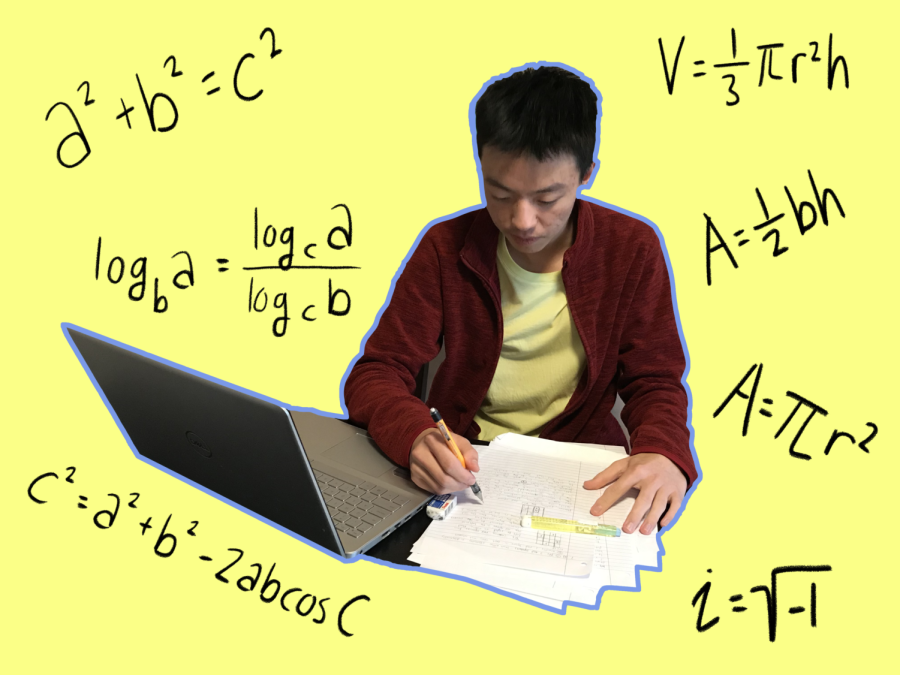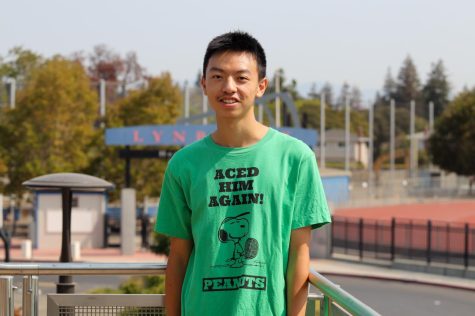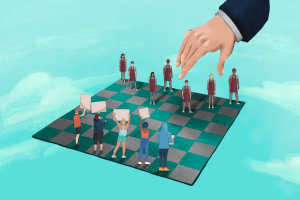The contest that sparked a revelation and motivation
Photo by Elliu Huang; graphic illustration by Elliu Huang and Diana Kohr
Given the right confluence of circumstances — a good night’s sleep, a comfortable chair and a quiet environment — I could finally achieve one of my greatest goals of the past few years.
March 12, 2021
One of my most recent contests was hardly a contest at all. I was aiming to qualify for the next level of a math contest that I had been trying to pass since eighth grade. In previous years, I had always missed the cutoff by a moderate margin, and, the week before, the first of two chances to qualify, I messed up on a problem that would have undoubtedly secured my qualification to the next level. The following week, I got up at 7 a.m. for my second and last chance of the year. I didn’t have quite as much time to prepare as I would’ve liked, but I believed that given the right confluence of circumstances — a good night’s sleep, a comfortable chair and a quiet environment — I could finally achieve one of my greatest goals of the past few years.
It was 7:15 by the time I had shaken out of my early-morning stupor. I sat down at my computer to start the contest but was too nervous to click the start button, so I focused on the things around me. The absence of the usual morning clatter from my brother and parents, who wouldn’t be awake for at least another hour, was jarring because I had grown accustomed to it. Nervously looking around, I picked up my tennis racket, which calmed my nerves a bit. Holding the worn-out grip of my racket reminded me of the consistency of my forehand and trust in my own abilities. The clock struck 7:30, and my hand trembled as I started the contest.
The contest was only 75 minutes, and, luckily, I breezed through the first few problems. A little bit of calculation here. Some algebraic manipulation there. Oh, a problem involving logarithms. As the tricks I’ve learned over the years clicked, I grew more confident, solving one problem after another.
Despite my early success, the next few problems proved challenging. 60 minutes had already passed, and I still needed to do at least one more problem in order to ensure my qualification, even if I made one silly mistake. I had attempted a geometry problem earlier but couldn’t figure out the last steps.
Sometimes, a moment comes along when the world slows down, and, although everything else moves at the same frenetic speed, we’re able to reflect in real time rather than in retrospect. It’s as if we’re ahead of ourselves, yet still in the present.
That morning, I remembered a day in late April two years ago, the last day I would see my friend before we went our separate ways during the summer. My friend loved to hit tweeners during tennis practice and was good enough to hit them with precision and consistency. I could not and usually hit more than just the tennis ball. I tried that day and missed the ball entirely, not to mention giving myself a bruise on the shins. Since I would not have another shot until next February, I decided to try again. As my friend lobbed the ball over me, I sprinted toward the baseline, and, just as the ball dropped to a perfect height between my legs, my friend called out, “Now!” I flicked my wrist as hard as I could and hit a tweener, down-the-line passing shot. Of course, luck was on my side, but it was as if the stars had perfectly aligned: my greatest effort came when I was down to my last opportunity.
Now it was February, and I was down to my last opportunity, reminded of that day I hit a near-perfect tweener. What I understood was how little this math contest would affect the world. I had spent years training and honing my math skills, yet, when the 75 minutes were over, the world would be the same as before. If no one else cared, then this challenge was mine alone. It mattered because it was the task before me now, what I wanted to achieve now. It’s a constant choice between now and later: intense concentration and exhaustion now for the sake of satisfaction later — all those afternoons spent studying problem-solving techniques in pursuit of an end that always seemed one step further.
I was out of laters. This was the end, and I knew what I had to do. I’ve never focused so intensely in a single moment before.
Then it clicked.
The equations I had set up couldn’t be directly solved, but the answer I sought could be found by solving a quadratic equation that was derived from simple substitution. I trembled a little as I watched my uneven handwriting write out the equations.
At last, I found the answer with a few minutes left on the timer. My arms relaxed, and when the timer ran out, I knew by instinct, by the throbbing in my hands and the blood roaring through my brain, before I even received my score, that I had made it.





























































Anirudh Bharadwaj • Feb 10, 2022 at 9:11 am
Hi Elliu,
Great story about your exercise in perseverance! I hope you had a blast!
Anirudh
Donna Miller • Mar 17, 2021 at 9:58 am
Very good read. Keep up the hard work and stay motivated!
Kevin • Mar 14, 2021 at 7:03 pm
Hey Elliu,
That was a fascinating read. Love to see math popping up on the Epic. Talk about promoting humanities in a STEM school—now, using humanities as a way to share your love for math is truly next level!
Congrats on the win. Rooting for you (even if this MAA season’s over).
Kevin